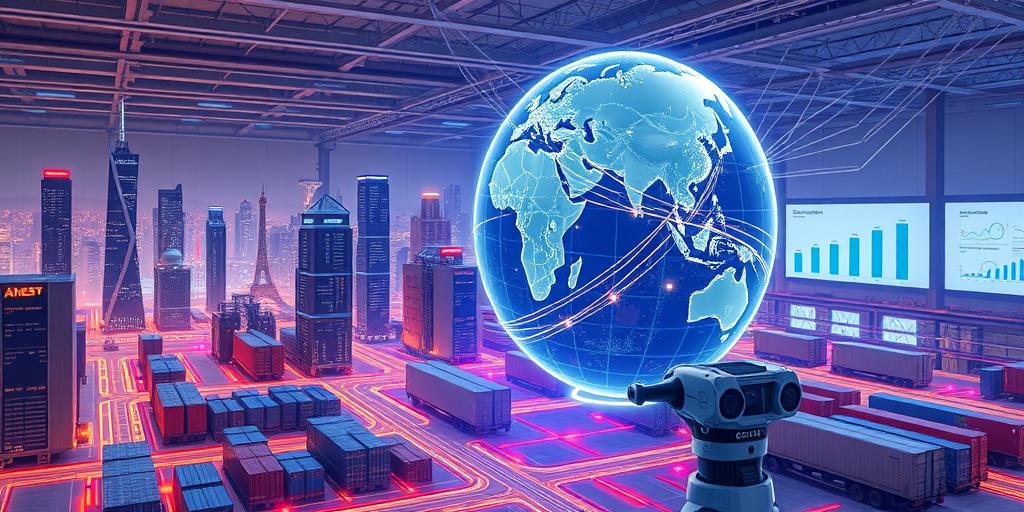The world of supply chain management is undergoing a rapid transformation, driven by the increasing adoption of AI Supply Chain solutions. AI is revolutionizing how businesses manage their supply chains, from optimizing inventory levels and forecasting demand to improving logistics and mitigating risks. By leveraging the power of data analysis and machine learning, companies can achieve unprecedented levels of efficiency, agility, and resilience in their supply chains.
Leveraging AI for Supply Chain Optimization
Introduction: The Power of AI in Supply Chain Management
AI is no longer a futuristic concept; it’s a powerful tool readily available to optimize various aspects of supply chain operations. The ability of AI to analyze vast amounts of data, identify patterns, and make predictions allows businesses to make data-driven decisions that improve efficiency, reduce costs, and enhance overall supply chain performance.
Benefits of AI in Supply Chain
Enhanced Efficiency and Productivity
AI-powered automation can streamline repetitive tasks, such as order processing, inventory management, and shipment tracking, freeing up human resources to focus on more strategic initiatives.
Improved Forecasting and Demand Planning
AI algorithms can analyze historical data and external factors to predict future demand accurately. This allows businesses to optimize production, inventory levels, and resource allocation, reducing stockouts and overstocking.
Optimized Inventory Management
AI can analyze inventory data to identify patterns and predict demand fluctuations. This allows businesses to optimize inventory levels, reducing storage costs and minimizing the risk of stockouts.
Reduced Costs and Waste
AI-powered optimization helps streamline processes, reduce errors, and minimize waste. By predicting demand accurately and optimizing resource allocation, businesses can significantly reduce operational costs.
Enhanced Risk Management and Resilience
AI can monitor supply chain data in real-time, identifying potential disruptions and risks early on. This allows businesses to take proactive steps to mitigate risks and ensure supply chain resilience.
Real-World Applications of AI in Supply Chain
Predictive Analytics for Demand Forecasting
AI algorithms can analyze historical sales data, market trends, and external factors like economic indicators to predict future demand with greater accuracy. This allows businesses to optimize production, inventory, and resource allocation to meet demand effectively.
AI-Powered Inventory Optimization
AI can analyze real-time data on inventory levels, demand patterns, and lead times to optimize inventory levels. This helps businesses avoid stockouts, minimize storage costs, and reduce waste.
Automated Procurement and Sourcing
AI can automate the procurement process by identifying the most suitable suppliers, negotiating prices, and placing orders. This helps businesses save time and resources while ensuring they get the best deals.
Supply Chain Risk Management and Mitigation
AI can monitor global events, weather patterns, and other factors that could disrupt supply chains. By identifying potential disruptions early on, businesses can take proactive steps to mitigate risks and ensure business continuity.
Route Optimization and Logistics Management
AI algorithms can optimize delivery routes, minimizing travel time and fuel consumption. This improves delivery efficiency, reduces transportation costs, and enhances customer satisfaction.
Implementing AI in Your Supply Chain
Identifying Key Areas for AI Implementation
To effectively leverage AI, businesses must first identify the areas of their supply chains that can benefit most from AI-powered solutions. This might include demand forecasting, inventory management, transportation, procurement, or risk management.
Choosing the Right AI Tools and Technologies
There are various AI tools and technologies available for supply chain management, each with its strengths and weaknesses. Businesses must carefully evaluate their needs and choose the tools that best align with their specific requirements.
Data Collection and Preparation
Effective AI implementation requires access to high-quality data. Businesses must ensure they have the necessary data sources, develop data collection strategies, and implement data cleaning and preparation procedures.
Building an AI-Enabled Supply Chain Ecosystem
Integrating AI into existing systems requires a strategic approach. Businesses must ensure their IT infrastructure can support AI applications and develop a robust data management system.
Overcoming Challenges and Ensuring Success
Implementing AI in a supply chain can present challenges, including data privacy concerns, resistance to change, and the need for skilled AI professionals. Overcoming these challenges requires careful planning, effective communication, and a commitment to continuous learning.
Case Studies: Real-World Examples of AI in Supply Chain
Company A: Optimizing Inventory Management with AI
Company A implemented an AI-powered inventory management system that analyzed historical sales data, market trends, and external factors. This allowed them to optimize inventory levels, reduce stockouts, and minimize storage costs.
Company B: Using AI for Predictive Maintenance
Company B used AI to predict equipment failures in their warehouses. By analyzing sensor data, AI algorithms could identify potential issues before they caused downtime. This helped them minimize downtime and reduce maintenance costs.
Company C: Leveraging AI for Supply Chain Risk Mitigation
Company C implemented an AI-powered risk management system that monitored global events, weather patterns, and other potential disruptions. By identifying potential risks early on, they could take proactive steps to mitigate their impact.
The Future of AI in Supply Chain
Emerging Trends and Innovations
The field of AI is constantly evolving, and new innovations are emerging rapidly. The future of AI in supply chain management will likely see the emergence of new AI tools and technologies, such as blockchain and quantum computing.
The Impact of AI on Supply Chain Jobs
While AI automation can streamline tasks, it also raises concerns about job displacement. However, AI is likely to create new opportunities in areas like AI development, data science, and supply chain optimization.
Ethical Considerations and Responsible AI Implementation
As AI becomes more integrated into supply chains, it’s crucial to address ethical considerations. This includes ensuring data privacy, transparency in decision-making, and mitigating potential biases in AI algorithms.
Embracing AI for a more efficient and resilient supply chain is no longer a choice; it’s a necessity. By leveraging the power of AI, businesses can unlock new levels of efficiency, agility, and resilience in their supply chains, ultimately gaining a competitive advantage in today’s dynamic marketplace.




